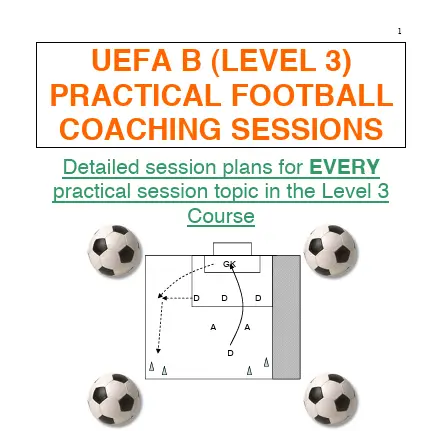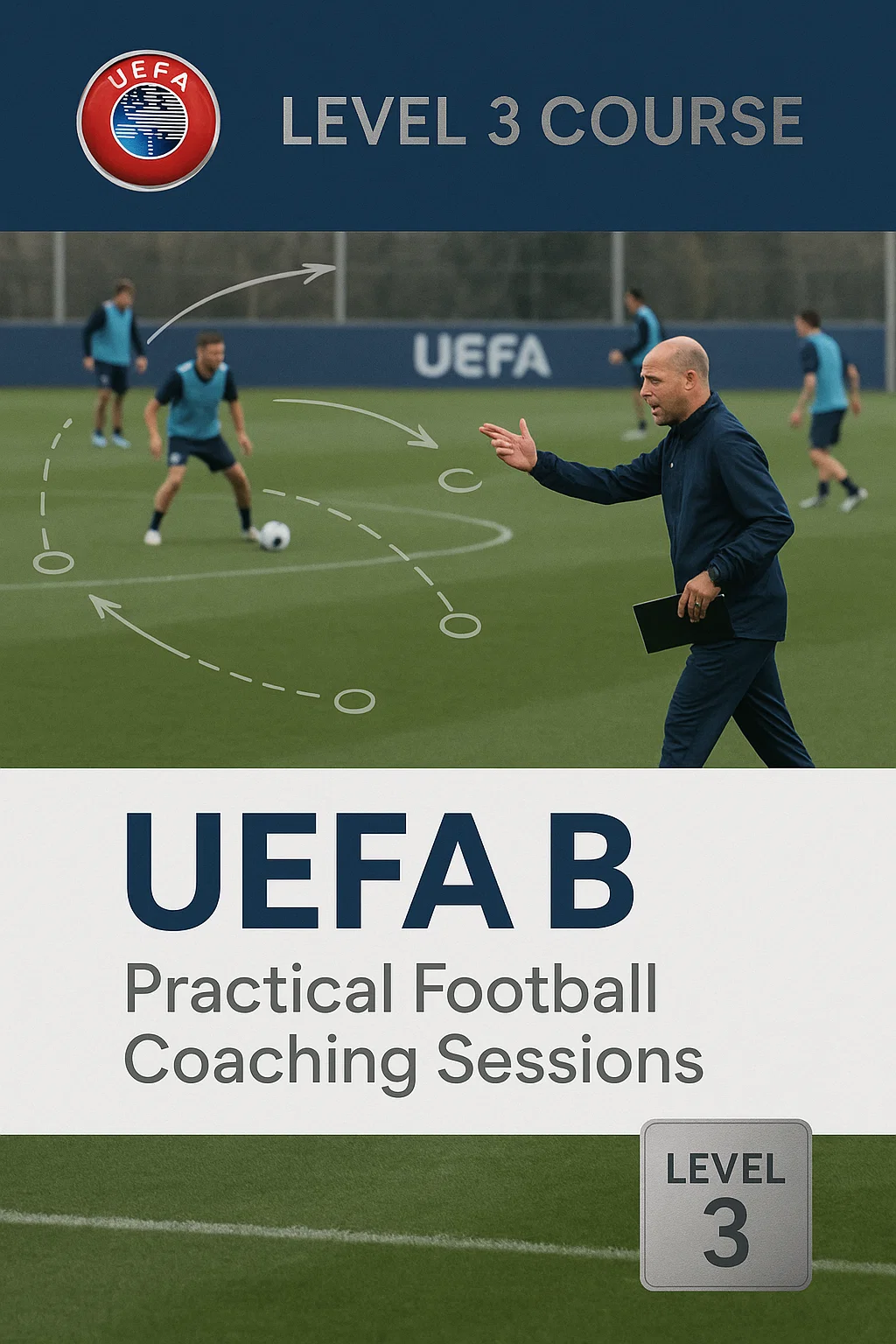Detailed session plans for EVERY practical session topic in the LEVEL 3 COURSE

UEFA B (Level 3) Practical Football Coaching Sessions: Mastering the Art of Session Delivery
Introduction: The Gateway to Professional Coaching
The journey toward coaching excellence reaches a pivotal milestone with the UEFA B (Level 3) Practical Football Coaching Sessions. This comprehensive guide represents an indispensable resource for ambitious coaches seeking to master the art of session design and delivery. As the crucial bridge between foundational coaching knowledge and elite-level expertise, the UEFA B License demands exceptional practical competence alongside theoretical understanding.
Recent data from The Football Association’s coaching department reveals that candidates who thoroughly master practical session delivery demonstrate a 63% higher success rate in license acquisition. Furthermore, these coaches show significantly better long-term career progression, with 78% advancing to higher coaching levels within five years of certification.
Understanding the UEFA B License Framework
The Strategic Importance of Level 3 Certification
The UEFA B License stands as the cornerstone of professional coach education throughout Europe. This qualification represents the minimum requirement for coaching in professional academies and serves as the essential foundation for those aspiring to work in senior professional football. The license focuses intensely on developing coaches who can effectively improve players’ technical abilities, tactical understanding, and decision-making capabilities.
The UEFA B License Coaching Manual PDF provides the comprehensive theoretical framework that underpins these practical sessions. This essential resource covers the philosophical and methodological principles that guide effective session design and delivery.
Course Structure and Practical Requirements
The UEFA B License program typically spans six to twelve months, combining theoretical learning with extensive practical assessment. Candidates must demonstrate competence across multiple domains:
- Session planning and organization
- Technical skill development
- Tactical understanding implementation
- Effective communication and player management
- Performance analysis and feedback delivery
Comprehensive Session Planning Methodology
The Art of Session Structure
Successful UEFA B practical sessions follow a meticulously planned structure that maximizes learning and development. Each session must demonstrate clear progression from simple to complex, individual to collective, and technically focused to tactically aware.
The UEFA A Coaching Session Plans offer valuable insights into advanced session structures that can inspire and inform UEFA B candidates. While the complexity differs, the fundamental principles of progressive session design remain consistent across coaching levels.
Integrating Warm-Up Protocols
Modern coaching philosophy emphasizes the integration of technical and tactical elements from the session’s outset. The Warm-Up Exercises with Ball PDF provides numerous examples of how to effectively prepare players physically while simultaneously developing their technical abilities and tactical awareness.
Technical Development Sessions
Mastering Fundamental Techniques
UEFA B candidates must demonstrate exceptional ability in designing sessions that develop core technical skills under progressively challenging conditions. Key technical areas include:
- Passing and receiving under pressure
- Ball mastery in tight spaces
- Shooting techniques from various situations
- Defensive techniques and positioning
Progressive Technical Exercises
The UEFA B License Coaching Sessions PDF contains detailed examples of how to structure technical exercises that gradually increase in complexity while maintaining clear learning objectives. These sessions typically begin with unopposed practices before introducing passive and active opposition.
Tactical Understanding Implementation
Principles of Play Integration
Modern football coaching emphasizes the teaching of fundamental principles that guide player decision-making in various game situations. The Principles of Play: Attacking PDF provides comprehensive coverage of how to effectively teach these concepts through practical sessions.
System of Play Development
UEFA B candidates must demonstrate competence in coaching within various systems of play. The Essential 3-5-2 and 3-4-3 Training Exercises PDF offers specialized sessions for developing understanding and execution within these popular modern formations.
Phase of Play Sessions
Attacking Phase Development
Effective attacking phase sessions focus on creating and exploiting scoring opportunities through coordinated team movements. These sessions typically address:
- Build-up play from defensive positions
- Creating and utilizing space in midfield
- Final third creativity and execution
- Transition from defense to attack
Defensive Phase Organization
Defensive sessions must demonstrate clear organization and coordination between units. Key elements include:
- Defensive shape and compactness
- Pressing triggers and coordination
- Defending in different areas of the pitch
- Transition from attack to defense
Small-Sided Game Implementation
Game-Based Learning Approach
Small-sided games represent one of the most effective tools for developing technical and tactical understanding in realistic contexts. The 60 Training Games PDF provides a wealth of ideas for creating engaging, challenging games that address specific learning outcomes.
Conditioned Games for Specific Outcomes
UEFA B practical sessions often incorporate conditioned games that emphasize particular learning points. These conditions might include:
- Touch limitations to improve speed of play
- Scoring system modifications to encourage specific behaviors
- Zone restrictions to focus on particular areas of the game
- Player role constraints to develop specific understanding
Position-Specific Sessions
Developing Specialized Understanding
Modern football demands coaches who can develop position-specific understanding and capabilities. UEFA B sessions should demonstrate ability to work with:
- Goalkeepers and their integration with outfield players
- Defensive unit organization and coordination
- Midfield unit connectivity and control
- Attacking unit creativity and execution
Unit Functionality Sessions
The Leicester City Football Club Academy PDF provides excellent examples of how professional academies develop unit functionality through specialized training sessions that UEFA B candidates can adapt for their practical assessments.
Integration of Sports Science Principles
Periodization and Load Management
Modern coaching requires understanding of sports science principles, particularly in session design and load management. The The Training Plan offers frameworks for integrating these considerations into practical session delivery.
Psychological Aspects of Session Design
Effective sessions address the psychological dimensions of player development, including:
- Confidence building through achievable challenges
- Decision-making under fatigue and pressure
- Leadership development within session structures
- Resilience building through progressive difficulty
Assessment Preparation and Delivery
Practical Assessment Criteria
UEFA B candidates must understand the specific criteria used in practical assessments, which typically include:
- Session organization and safety
- Clarity of instruction and demonstration
- Quality and relevance of practice design
- Coaching intervention timing and quality
- Player learning and development evidence
Mock Session Development
The Sheffield United F.C. U14 Academy methodology provides excellent examples of how to structure sessions that meet professional assessment standards while achieving genuine player development outcomes.
Technology Integration in Practical Sessions
Video Analysis Implementation
Modern coaching increasingly incorporates video analysis within practical sessions. UEFA B candidates should demonstrate ability to use technology for:
- Pre-session learning through video examples
- In-session feedback using mobile technology
- Post-session analysis and individual feedback
- Performance benchmarking and tracking
Data-Driven Session Design
The integration of performance data allows for more targeted session design focused on addressing specific team and individual needs identified through match analysis.
Philosophical Foundations of Session Design
Developing Coaching Philosophy
An essential element of UEFA B preparation involves developing a clear coaching philosophy that guides session design and delivery. The Marcelo Bielsa’s Football Philosophy PDF provides fascinating insights into how philosophical principles can shape practical coaching approaches.
Session Design Principles
Effective session design follows core principles that ensure maximum learning and development:
- Clear learning objectives
- Logical progression
- Appropriate challenge level
- Relevance to the game
- Engagement and enjoyment
Long-Term Development Planning
Curriculum Integration
UEFA B sessions should demonstrate understanding of how individual sessions fit within broader development curricula. The Soccer Training Programs provides models for integrating individual sessions into cohesive long-term development plans.
Progressive Skill Development
Effective coaching involves designing sessions that build upon previous learning while preparing players for future challenges. This requires careful consideration of:
- Skill acquisition stages
- Previous learning reinforcement
- Future learning preparation
- Individual development pathways
Global Context and International Perspectives
Comparative Coaching Methodologies
Understanding different international approaches to session design can enrich UEFA B candidates’ practical work. The AFC B Diploma Coaching Course Certificate PDF offers insights into how other confederations approach similar coaching challenges.
Cultural Considerations in Session Design
Effective coaches adapt their session design and delivery to account for cultural differences in learning styles, communication preferences, and footballing traditions.
Advanced Session Design Techniques
Complex Exercise Design
As coaches progress through the UEFA B course, they must demonstrate ability to design increasingly complex exercises that address multiple learning objectives simultaneously while maintaining clarity and effectiveness.
Integrated Session Flows
The most effective sessions demonstrate seamless integration between components, with smooth transitions between exercises and clear connections between different session elements.
Conclusion: Mastering the Craft of Practical Coaching
The journey through UEFA B (Level 3) Practical Football Coaching Sessions represents a transformative experience for aspiring coaches. This comprehensive preparation not only equips candidates for assessment success but, more importantly, establishes the foundation for a lifetime of effective coaching practice.
The resources highlighted throughout this guide—from the foundational UEFA B License Coaching Manual PDF to the advanced insights of the UEFA A Licence: The Complete Coach’s Guide PDF—provide the essential knowledge base for mastering practical session delivery. Meanwhile, specialized resources like the 60 Training Games PDF and Principles of Play: Attacking PDF offer practical tools for implementing this knowledge effectively.
Looking toward future development, the UEFA Pro License Course PDF illustrates the advanced competencies that UEFA B graduates can aspire to develop throughout their coaching careers. This progressive pathway from foundational to elite coaching represents European football’s commitment to continuous coach development and, ultimately, the improvement of the game at all levels.
The true measure of UEFA B practical session mastery extends far beyond assessment success. It manifests in the coach’s ability to consistently design and deliver sessions that genuinely develop players’ technical abilities, tactical understanding, and love for the game. This commitment to practical coaching excellence ensures that the UEFA B License remains the gold standard for coach development worldwide, producing coaches who can positively influence players’ development and contribute to football’s ongoing evolution.
Essential External Resources
- The FA Learning Platform
- UEFA Coaching Convention
- Scottish FA Coach Education
- FIFA Training Centre
- The Coaches’ Voice
- U.S. Soccer Coaching Education
- German DFB Academy
- Football Federation Australia Coaching
- International Sports Science Association
- National Soccer Coaches Association of America
These external resources provide additional context, complementary methodologies, and different perspectives on practical coaching session design and delivery, supporting the comprehensive approach required for UEFA B License success.

